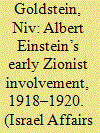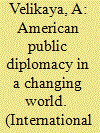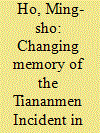| Srl | Item |
| 1 |
ID:
154052


|
|
|
|
|
| Summary/Abstract |
This article presents the very beginning of Albert Einstein’s involvement on behalf of the Zionist movement. Although he was familiar with Zionist activists, it was only World War I and the rabid anti-Semitism attending it that led him to rediscover his affiliation with the Jewish people and to subscribe to the Zionist solution to their misery. Einstein tried to combine his support for the national Zionist ideals with the universal worldview to which he adhered from time immemorial, gradually coming to support establishment of the national home in Palestine as a solution for ‘The Jewish Problem’.
|
|
|
|
|
|
|
|
|
|
|
|
|
|
|
|
| 2 |
ID:
155351


|
|
|
|
|
| Summary/Abstract |
TODAY, many countries rely on public diplomacy (PD) when dealing with expert communities and civil society in other countries: foreign policy is growing increasingly personalized all over the world making PD dealing with specific circles of foreign audiences a useful and very much needed instrument.
|
|
|
|
|
|
|
|
|
|
|
|
|
|
|
|
| 3 |
ID:
184089


|
|
|
|
|
| Summary/Abstract |
This article examines the three-decade evolution of remembering the Tiananmen Incident in Taiwan by looking at annual commemorative activities. There is a decisive shift from a patriotic understanding to a cosmopolitan perspective grounded in universal values. The earlier memory was based on an ethnic nationalism that stressed consanguinity among Taiwanese and mainland Chinese and a narrative of the Chinese Republican Revolution. However, such framing lost its persuasiveness and the memory of Tiananmen faded as Taiwanese, particularly the younger generation, embraced an indigenous identity. China’s rapid economic growth and its ascendency as a new world power neutralized the potency of the earlier memory because it demonstrated the possibility of nationalistic aspirations without democracy. Since 2011, commemorative rallies have revived and proceeded with a newer understanding of the Tiananmen Incident in terms of human rights, civil society, and youth activism. This article argues that this ‘mnemonic change’ reflects Taiwan’s democratization and the indigenization of Taiwanese society, enabling young organizers to articulate their own Tiananmen memory by referencing global civil-society activism. Mnemonic change in Taiwan is examined with a comparative reference to the parallel development in Hong Kong.
|
|
|
|
|
|
|
|
|
|
|
|
|
|
|
|